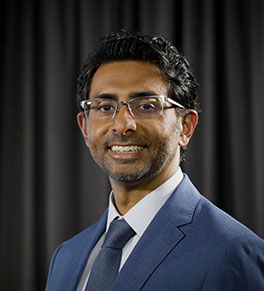Lung cancer screening is essential for early detection, treatment

Too few people are screened for lung cancer, which is found early in only 20% of patients, says lung cancer surgeon Dr. Hari Keshava. “The scan is painless and if we find a nodule that happens to be lung cancer, we can do something about it.”
Lung cancer remains the deadliest cancer for U.S. men and women, largely because it isn’t detected early enough, says UCI Health lung cancer specialist Dr. Hari B. Keshava.
That’s why the thoracic surgeon stresses the importance of screening every November during Lung Cancer Awareness Month.
In addition to encouraging current and past smokers to get a simple CT scan, Keshava has launched a clinical trial to extend screening to family members of certain lung cancer patients who rarely or never smoked.
“The problem right now is we only find lung cancer early in about 20% of patients,” says Keshava, lamenting how few people get the needed CT scans.
“The scan is painless, and if we find a nodule that happens to be lung cancer, we can do something about it.”
Early detection is key
When lung cancer is diagnosed early, surgery can offer a cure. Other treatment options available include immunotherapy, targeted therapy and radiation.
“We’re seeing patients, even with later stage lung cancer, living for a long time,” Keshava says.
“So if you’ve smoked in the past — that’s the main reason we screen — don’t be afraid to get screened; there’s no stigma.”
Insurance will cover the scan if you meet certain criteria.
“If you’re 50 to 80 years old, have smoked a pack per day over 20 years, and are currently smoking or have quit within the last 15 years, insurance covers a low-dose CT scan,” he says.
Lung disease is personal
Before Keshava became a physician, he worked for the Los Angeles Department of Water and Power doing wireless telecommunications. “I was an electrical engineer in my previous life,” he says.
That was before his mother had to undergo a double lung transplant. After helping her recover, he decided to switch careers and go into medicine.
"I decided that this was what I wanted to do with my life,” he recalls. "That was my impetus to become a thoracic surgeon.”
Today, Keshava is an assistant professor in the UC Irvine School of Medicine's Department of Surgery and chief of thoracic surgery for the U.S. Department of Veterans Affairs at the Tibor Rubin VA Medical Center in Long Beach.
“I wanted to be in an academic setting where I could do research, and with UCI Health and the VA, everything fell into place. It’s a good fit.”
Screening nonsmokers
Keshava’s current research relates to the 10% to 20% of lung cancers seen in people who never (or rarely) smoked. Many of these patients have a type of lung cancer driven by a genetic mutation.
His clinical trial at the UCI Health Chao Family Comprehensive Cancer Center offers low-dose computed tomography (CT) scans for immediate family members of these patients. His ultimate goal is to broaden the standard criteria for lung cancer screening.
“We’ve seen a lot more patients who don’t have a smoking history but still get lung cancer,” he says. “There’s a predominance of lung cancer in family members, so why don’t we screen them for a genetic or an environmental component?” That’s the question that motivated his clinical trial.
If you are between the ages of 40 and 80 and have at least one first-degree relative with a diagnosis of lung cancer with a driver mutation — a genetic alteration “driving” the cancer growth — you could be eligible for a free lung cancer screening at UCI Health.
New guidelines needed
“We don’t have screening guidelines for anybody who doesn’t smoke,” says Keshava, which means that their lung cancer is usually found either incidentally or once they already have symptoms.
“We see a lot of lung cancer found after a CT scan for another reason, like after a car accident, or because of later-stage symptoms such as a cough or intractable pain.”
Findings from the investigator-initiated clinical trial could lead to changes in screening guidelines, Keshava says.
“I hope to open up lung cancer screening for a whole population that we currently don’t screen for, because if we find the cancer early, we can cure it with surgery.”
Interested in participating in this clinical trial? Apply online today.




